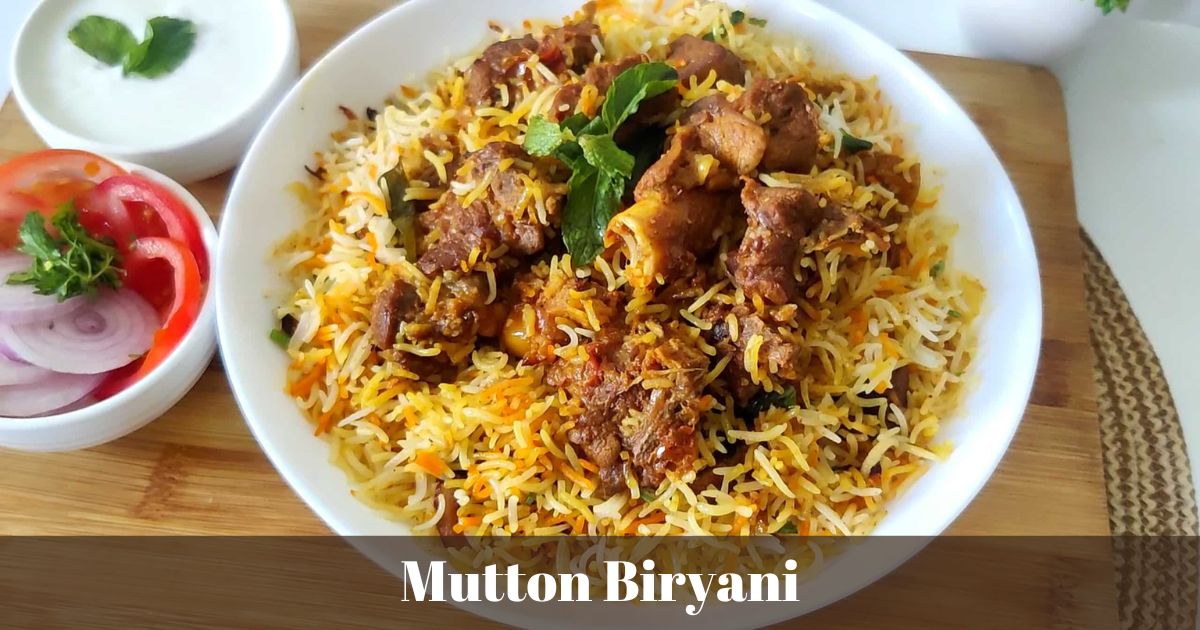Introduction:
Mutton Biryani is a majestic and aromatic rice dish that has
captured the hearts of food enthusiasts worldwide. This delectable culinary
delight is a harmonious blend of succulent mutton pieces, fragrant basmati
rice, and a myriad of spices, creating a symphony of flavors that will leave
you craving for more. In this article, we will take you on a gastronomic
journey, exploring the secrets behind the perfect Mutton Biryani, including its
origins, a step-by-step recipe, its famous Hyderabadi variant, and even its
calorie count. Let's delve into the world of Mutton Biryani!
Mutton Biryani: A Glimpse into its Rich History
Mutton Biryani's origins can be traced back to the royal kitchens
of India, where it was served as a sumptuous delicacy to the Mughal emperors
and Nawabs. Over the centuries, it spread across the Indian subcontinent, and
each region gave it its unique touch, resulting in various regional variations.
Among these, the Hyderabadi Mutton Biryani stands out for its distinct taste
and cooking technique, making it a timeless favorite.
Mutton Biryani Recipe: Unraveling the Culinary Magic
Here's a delightful Mutton Biryani recipe that will transport your
taste buds to culinary heaven:
Ingredients:
·
Basmati rice: 2 cups
(soaked for 30 minutes)
·
Mutton: 500 grams (cut
into pieces)
·
Yogurt: 1 cup (whisked)
·
Onions: 2 large (thinly
sliced)
·
Ginger-garlic paste: 2
tablespoons
·
Green chilies: 2-3
(slit)
·
Fresh mint leaves: a
handful (chopped)
·
Fresh coriander leaves:
a handful (chopped)
·
Saffron strands: a few
(soaked in warm milk)
·
Ghee: 4 tablespoons
·
Oil: 2 tablespoons
·
Bay leaf: 1
·
Cinnamon stick: 1-inch
piece
·
Cloves: 4-5
·
Green cardamom pods: 3-4
·
Black peppercorns: 6-8
·
Red chili powder: 1
teaspoon
·
Biryani masala: 2
tablespoons
·
Lemon juice: 1
tablespoon
·
Salt: to taste
Instructions:
1.
In a large pot, boil the
soaked basmati rice with some whole spices (bay leaf, cinnamon stick, cloves,
green cardamom, and black peppercorns) until it's 70% cooked. Drain and set
aside.
2.
Marinate the mutton
pieces with yogurt, ginger-garlic paste, red chili powder, biryani masala,
lemon juice, and salt. Let it rest for at least 1 hour.
3.
In a heavy-bottomed
vessel, heat ghee and oil. Add the thinly sliced onions and fry until they turn
golden brown and crispy. Remove half of the fried onions and set them aside.
4.
Add the marinated mutton
to the vessel and cook until the mutton is tender and the ghee starts to
separate from the masala.
5.
Layer the partially
cooked rice over the mutton in the vessel. Sprinkle the saffron-soaked milk,
chopped mint leaves, and chopped coriander leaves over the rice.
6.
Top it with the
remaining fried onions.
7.
Seal the vessel with a
tight-fitting lid or aluminum foil and cook on low heat for about 20-25
minutes, allowing the flavors to meld together and the rice to cook fully.
8.
Once done, gently fluff
the rice with a fork and serve hot, garnished with more fresh mint leaves and
fried onions.
Hyderabadi Mutton Biryani: A Culinary Gem
Hyderabadi Mutton Biryani is a special variant known for its
authentic preparation and delightful taste. The key difference lies in the
"dum" cooking technique, where the partially cooked rice and
marinated mutton are layered together and cooked on low heat, allowing the
flavors to blend perfectly.
Mutton Biryani Calories: A Dish Worth Indulging
The calorie count of Mutton Biryani may vary based on the serving
size and ingredients used. On average, a standard serving of Mutton Biryani may
contain approximately 500 to 600 calories. However, it's essential to remember
that the experience of relishing this flavorful dish is worth every calorie.
FAQs: Frequently Asked Questions about Mutton Biryani
Q: Can I use lamb instead of mutton for this recipe?
A: Yes, you
can use lamb meat as a substitute for mutton. The cooking time may vary
slightly as lamb is usually tenderer than mutton.
Q: Can I make Mutton Biryani without using the dum cooking technique?
A: While the dum cooking technique enhances the flavors of the
biryani, you can still prepare a delicious Mutton Biryani in a regular pot.
Simply cook the marinated mutton and rice separately, and then layer and steam
them together for a few minutes before serving.
Q: How can I prevent the rice from sticking together?
A: To
prevent the rice from sticking together, ensure that you don't overcook it
during the initial boiling process. Use good quality basmati rice, and after
boiling, rinse it with cold water to remove excess starch.
Conclusion:
Mutton Biryani is more than just a dish; it's a celebration of flavors and a testament to the rich culinary heritage of India. The delightful combination of tender mutton, fragrant rice, and aromatic spices makes it a favorite for special occasions and gatherings. So, embrace your inner chef, follow this recipe, and savor the heavenly taste of Mutton Biryani. Happy cooking!
